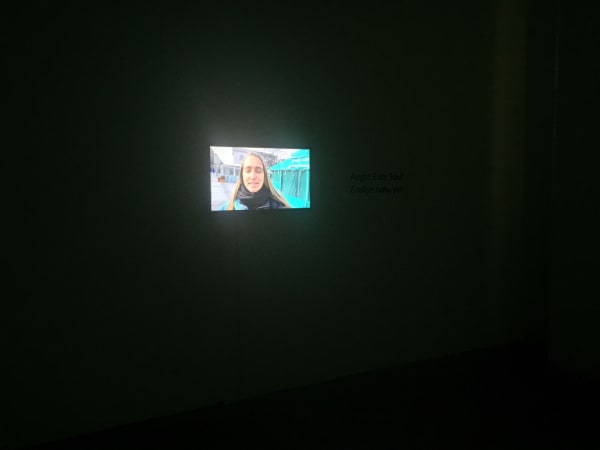Susan Hefuna: Angst Eats Soul
Pi Artworks Istanbul is pleased to announce Susan Hefuna's solo exhibition, Angst Eats Soul, featuring three video works by the artist. Parallel to her Istanbul exhibition, Hefuna's works from Guggenheim collection is on view at The Creative Act: Performance, Process, Presence by Guggenheim Abu Dhabi, which runs until the end of July.
Since 2001 artist Susan Hefuna creates Crossroads videos in different counties all over the world. Hefuna's Crossroads are both personal and in general relevant. They describe a point in time and space, where two lines meet/cross or a point in time that requires a choice to be made. Hefuna's video works show life as it is -shot in one go- with digital consumer equipment. Her films require no post-production, editing or special effects. She does not intend to create cinema like movies, rather rough sketches of reality. "The editing takes place before I actually start shooting. The time of active doing nothing and observing places often for years before I actually do the shooting is a kind of editing in advance" the artist quotes. Structure is one important leitmotif Hefuna draws through all her works using different media. She adopts the method of working 'in one go' not only in her videos but also in her multilayered ink drawings, photographs or participatory projects that engage the audience directly.
Hefuna's fifth solo exhibition with Pi Artworks Istanbul/London is named after her video work, Angst Eats Soul. In 2016, for a day, in the streets of Munich, Hefuna asked 87 people to say the words 'Angst Essen Seele' (Angst Eats Soul), inspired by Fassbinder's film Angst Essen Seele auf (Munich, 1974). Hefuna's work raises questions of identities today, of belonging and non-belonging to certain cultural and social groups.
Marxloh Crossroads (2015) observes an intersection in Duisburg, Germany. The area has a large proportion of 2nd and 3rd generation Turkish migrants and is famous for its wedding dress shops and Turkish restaurants. The street is often designated by German media as 'no go area' and its population is often seen as alienated and disconnected from mainstream German society. Yet, when viewing those walking through the street and enjoying Turkish food, there appears nothing to be dangerous or strange about it.
In the 2006 video Ana/Ich Hefuna asked 81 people in Cairo in one day, including the artist herself, to say a simple statement: ANA (Myself). Ana (The Arabic equivalent of Ich) is a palindrome that sounds round and smooth, through repetition it become timeless. The German Ich can only be read one way and sounds rather hard.
Susan Hefuna, b. 1962. Major exhibitions include The Creative Act: Performance, Process, Presence, Guggenheim Abu Dhabi, UAE (2017); ToGather (solo), Whitworth Art Gallery, Manchester, UK (2017); Barjeel Art Foundation Collection, Whitechapel Gallery, London, UK (2016); Susan Hefuna: Crossroads 2002-2015 (solo), Pi Artworks London, UK (2016); The Strange and the Familiar (solo), UBS Schloss Wolfsberg, Switzerland (2015); Contemporary Art of the Middle East, LACMA, Los Angeles, USA (2015); Another Place (solo), Sharjah Art Foundation, Bait Al Serkal, Sharjah, UAE (2014); Buildings (solo), Osthaus Museum, Hagen, Germany (2014); Here and Elsewhere, New Museum, New York, USA (2014); Nouvelles Vagues- Champs Elysees, Palais de Tokyo, Paris, France (2013); On the Edgware Road, Serpentine Gallery, London, UK (2012); Edgware Road @ Cairo 2010/1431 (solo), The Townhouse Gallery, Cairo, Egypt (2010); On Line: Drawing Through the Twentieth Century, Museum of Modern Art, New York, USA (2010); Fare Mondi, 53rd Venice Biennial, Italy (2009); and The Jameel Art Prize, Victoria and Albert Museum, London, UK (2009). Public collections holding her work include Museum of Contemporary Art Chicago, USA; LACMA, USA; British Museum, UK; The Louvre Museum, France; Museum of Modern Art Collection, USA; Sharjah Art Foundation, UAE; and Victoria and Albert Museum, UK. Her work is documented in three Volumes Pars Pro Toto (2007-2014), edited by curator Hans Ulrich Obrist.





